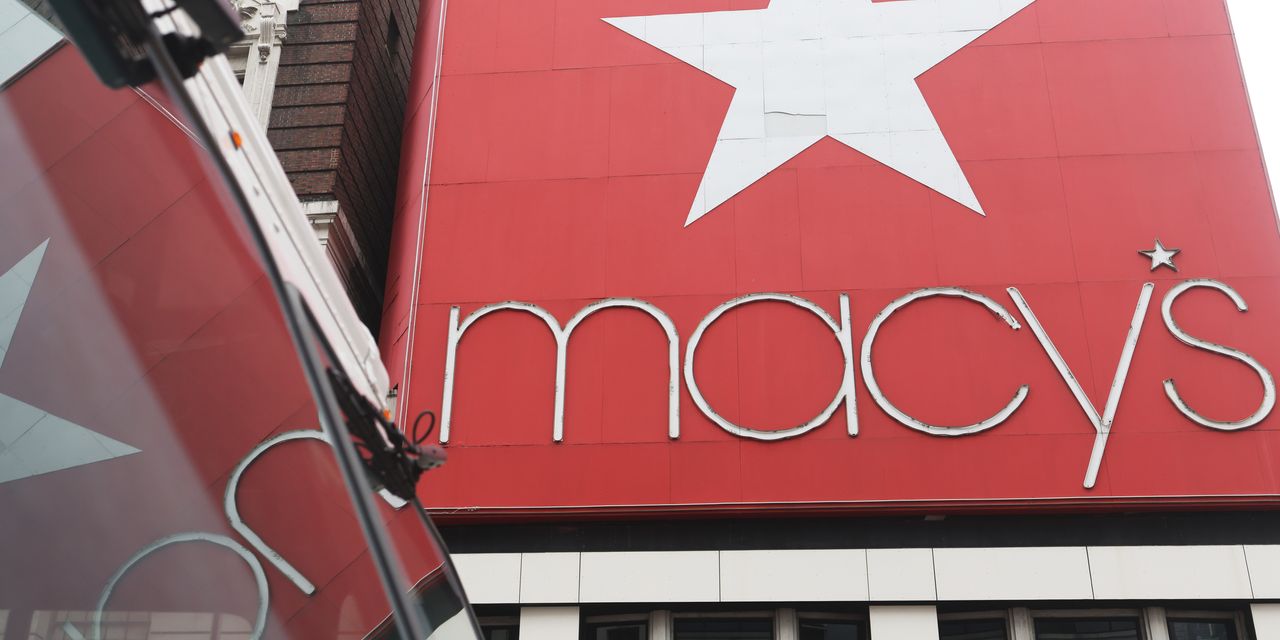Macy’s
and
Dick’s Sporting Goods
stocks slid double-digits on Tuesday after the companies sounded the alarm over a looming decline in consumer health, echoing a tone taken by other retailers this earnings season.
Dick’s (ticker: DKS) cut its outlook for the fiscal year and missed earnings expectations for the first time in three years.
Macy’s
(M) posted a solid quarter, but the company’s management said credit-card delinquency rates—a gauge of consumer financial well-being—had increased at a faster clip than expected.
“We continue to have a cautious view on the consumer,” said Macy’s chief financial officer Adrian Mitchell on a call with investors Tuesday. “In addition to the headwinds discussed on prior earnings calls, the expiration of student loan forgiveness beginning in October, higher interest rate levels, and lower new job creation are all new pressures on the consumer.”
Macy’s stock closed 14% lower, and Dick’s 24% lower. The results also sent a chill through other stocks in the consumer discretionary space. The
SPDR S&P Retail ETF
(XRT) fell 2.8% Tuesday.
But to those following the course of retail earnings season, the warnings coming from Macy’s and Dick’s are hardly surprising.
“The consumer has been relatively resilient, but as we look a little bit under the surface, there’s some evidence to suggest that the consumer is becoming a little bit more strained,” said Corey Tarlowe, analyst at Jefferies, on a call with Barron’s.
Other retailers have raised similar concerns.
Target
(TGT),
Home Depot
(HD), and
Lowe’s
(LOW), for instance, warned that demand for big-ticket, discretionary purchases was still weak—a sentiment that Macy’s repeated Tuesday.
Even the strong results from
Walmart
(WMT) and off-pricers
TJX Cos.
(TJX) and
Ross Stores
(ROST) can have troubling implications for consumer health. Part of the reason these companies have performed so well is because shoppers are flocking to their stores in an attempt to stretch their budgets.
“Our position is one where if things do get tougher, [consumers] are going to increasingly look for value, and we’re going to be able to grow the top line,” said
Walmart
CEO Doug McMillon on a call with investors last week.
Neil Saunders, managing director at
GlobalData,
wrote that Walmart’s strong results, and Target’s weak ones, are two sides of the same coin. Target’s sales have taken a hit because it has a bigger discretionary assortment, while Walmart has gained market share in its grocery business as people prioritize spending on food and essentials.
“Walmart’s success isn’t really a sign of a strong economy,” he wrote. “It’s a sign of an economy in which consumers are feeling the pinch. And vice versa for Target.”
These trends provide a downcast backdrop for the retailers that have yet to report earnings, including
Abercrombie & Fitch
(ANF),
Kohl’s
(KSS),
Burlington Stores
(BURL),
Gap
(GPS), and
Nordstrom
(JWN).
Tarlowe, however, believes companies with a strong focus on value or strong brand momentum could still perform well, despite the macro outlook. He points to companies such as Abercrombie, which posted a surprise profit last quarter as the company’s reinvention plan starts to take root.
Write to Sabrina Escobar at [email protected]
Read the full article here





